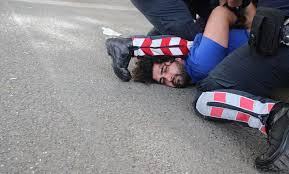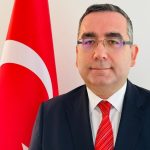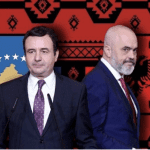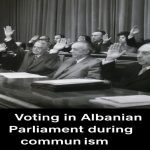The Albanian police have sadly not reflected and continue to use disproportionate amount of force and violence failing to learn the lesson that had to be learned after the murder of the young Klodian Rasha. This was the most recent reaction of the Council of Europe’s Commissioner on Human Rights, after learning about the beatings that were sustained by some activists of the Alliance for the Protection of the Theater at one of the police commissariats in Tirana.
The photographs of beaten music teachers and the testimony of university professors that witnessed a brutal behavior at the hands of the police is the ugliest stain on this institution’s reputation. It comes just days after the police suffered one of the greatest waves of protest against it, following the unwarranted and illegal murder of a young man by a police officer. The events shook the entire country and protest of consecutive days, wreaked havoc especially in Tirana. The Minister of Interior was replaced with a more neutral civilian figure whereas the demand to replace the Police chief was rebuked.
The police relationship with the people is anyway under a lot of duress following the daily skirmishes with citizens about the rules of the pandemic and the memory of the aggressive clamp down on the protests ensuing the demolition of the National theater has not faded either. The heavy boot of police officers on the face cheeks of young architecture students and the ranks of police with ripped out nametags off their uniforms are still hanging on the halls of shame of the now departed Minister.
Political scientist and theoreticians of all sorts often argue about the complex relation that the police, an institution that uses force, carries weapons and has the uniform representing the strength of the state should have with the rest of society. Even in advanced states and democracies such as the United States the police force finds itself often under attack from the civil society and media for its brutality, racism or other problems.
However everyone agrees in one juncture: police needs citizens’ trust to work.
The police is not an invader army that can muster its strength from fear. If everyone disagrees and is obeys there will be no much use for the police. The police does not stop Leviathan. The Albanian police force dos not just end a new leadership although that would be a step in the right direction. The police force belongs to no single majority other than the Albanian citizens, they are not the police of this government or of this Prime Minister.
They ultimately need to rethink their approach to the young vital segments of society. They need to restore their trust. They cannot engage in a fight with artists, with teachers, with activists especially when there is no obvious need, when there is no public danger to respond to. They risk to break the public trust which has been regained with a lot of pain. This country has unfortunately examples of the calamity that follows otherwise.










